'Probably because he was aware that this was his 100th ODI win as captain. Or probably because, in the first of its knock-out games, his team had produced the sort of all-round display that induces smiles.'
The amazing Prem Panicker on India's march into the semis.
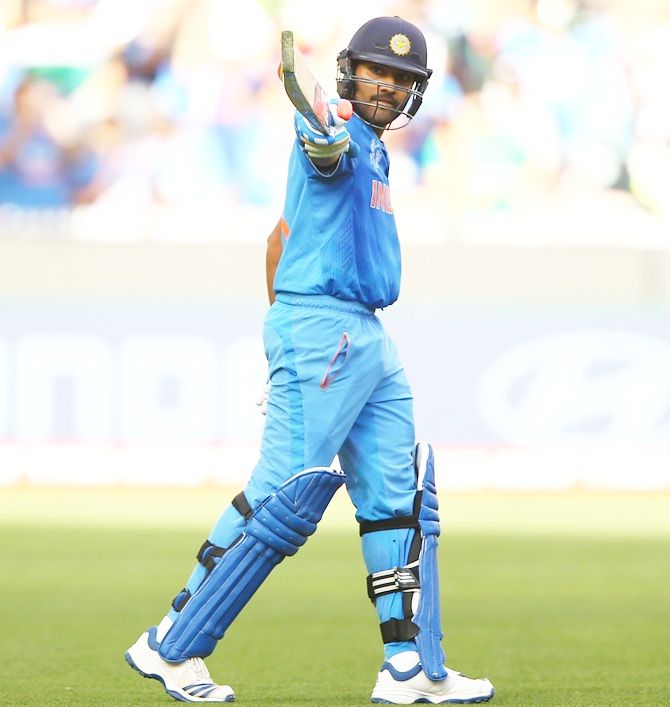
Being in control in a clutch game can be energising but equally, it can emasculate. Bangladesh skipper Mashrafe Mortaza experienced both in the space of the Indian innings.
Off the second ball of the 9th over, Shikhar Dhawan’s short-arm jab at a Mashrafe Mortaza delivery went for four. For the next 39 deliveries, the fences were left unmolested until, off the last ball of the 15th over, Rohit Sharma skipped down the wicket to get under a Nasir Husain delivery and lifted it over the straight boundary.
That was a release shot, but it brought no relief to the batsmen -- the next boundary, a fortuitous edge to third man by Ajinkya Rahane -- came after a further 65 deliveries, off the last ball of the 26th over.
Of the 20 overs between 11 and 30, Bangladesh bowled 13 for under four runs per over; four of those were under 3 rpo. That's pressure -- quantifiable, palpable, mentally debilitating when batting first with the intent to put up a winning target.
It told on the Indians who, despite a healthy 54/0 in the first 10 overs, could make no headway against disciplined bowling and a parsimonious fielding unit. And it brought wickets: Dhawan (30 off 50) charged Shakib al-Hasan and was stumped; in the following over Virat Kohli (3 off 8) slapped a widish ball from Robel Hussain to mid-off, and Ajinkya Rahane’s (19 off 37) pain-filled attempts to find a way out of the trap ended with a miscued loft to extra cover.
That is when Mortaza got ahead of himself. Rather than escalate pressure, he eased it. He pushed his fielders back on their heels on the edge of the circle, he had part-time trundlers on to save his best bowlers for the death.
His focus was on his team's weakness; his intent being to minimise damage to his team rather than inflict more on the opposition.
Suresh Raina found the space to breathe freely; his freedom eased the load on Rohit Sharma and between them, Raina and Rohit burgled a game Bangladesh had under lock and key.
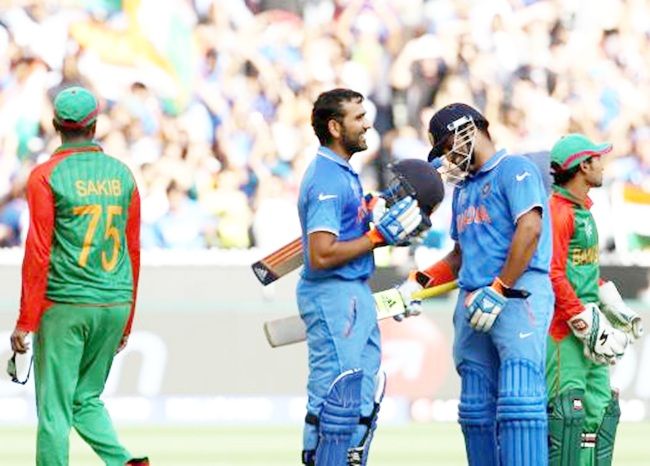
The paradox of Rohit Sharma is that he delights the fan, and exasperates him, for the same reason: He doesn't just 'make it look easy', for him it is easy. So easy, there is no apparent reason why he cannot just go out there and cream it every time.
There are storied strokemakers at this World Cup, but unlike almost all his tribe, Rohit eschews the use of power. Where others hit the ball, he strokes through it -- off any length, off either foot, on either side of the wicket, with the same felicity.
When he is on song, there is no visible increase of effort whether he is guiding a single, stroking the four, or lofting the straight six -- they all flow with the same easy grace.
That almost unreal talent is its own curse. Rohit can never seem to accept that sometimes, the opposition and the conditions can conspire to make things hard. He resents checks; he views them as lese-majeste and, in the off-with-his-head manner of the exalted, attempts to muscle the opposition into submission.
Ironically, it is when he forces the ball that he falls most often; when he strokes it, he reminds you of the line once used to describe the England batsman Frank Woolley: 'When you bowled to him there weren't enough fielders; when you wrote of him there weren't enough words.'
That was the difference today. Rohit had to work, as he has often; he was willing to work, as he is only rarely.
His 50 took him 70 deliveries. He was patient through the dry spells. He watched three of his batting peers come, struggle and leave, and he held his nerve. He created cover for Raina and allowed him to settle; when Raina began easing through the gears, he was content to play second fiddle and let his partner have the bossing of the game.
And then, when the time was right for the team, he turned it on. And in one brief passage, brought together all that is best about his batting.
Raina (65 off 57 with 7 fours and a six) had in the 44th over miscued a pull and skied to the 'keeper after a typically electric cameo that more than made up for the boundary-drought earlier in the Indian innings.
Rohit decided that it was finally time to turn it on.
Rubel Hossain had bowled his previous eight overs and taken a wicket at an economical 34 runs. Rohit started with him: in the 46th over, he started by easing an almost yorker-length delivery high into the straight stands with a gasp-inducing brevity of effort; staying back to the next ball, he pulled with timing through the square leg region, and rounded out the over with a dreamy lofted extra cover drive for another four.
Up next was Taskin Ahmed who, if anything, had done better than Rubel -- his first six overs had yielded a mere 14. Rohit eased a short ball over the backward square leg fence; to the next ball he read a change-down of pace with contemptuous ease and pulled elegantly past square leg.
Those shots in microcosm was the Rohit innings -- shots off front foot and back, to off and on, each an effortless response to the sharpest questions posed by the best of the opposition bowlers.
It was almost anti-climactic when, off the last ball of that Taskin over, Rohit (137 off 126, 14 fours and three sixes) tripped over a yorker and guided it onto his stumps off the inner edge.
Thanks in the main to the Sharma-Raina partnership of 122 in 95 deliveries, and an enterprising 23-off-10 spurt at the end from Ravi Jadeja, India added 159 runs after the 32nd over, 97 off those in the last ten, and put 302 for six on the board.
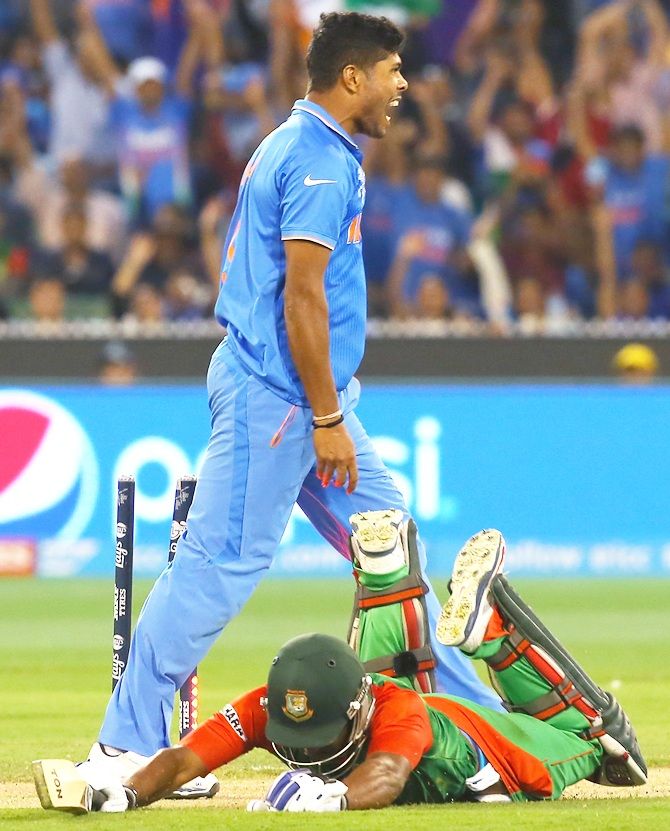
Ghosts, say those who believe in such, can materialise at the most unexpected times. India encountered one in the third over of the Bangladesh reply.
Almost exactly eight years ago -- on March 17, 2007 -- a precociously talented 18 year old had launched a stunning assault on a bowling attack led by Zaheer Khan, Ajit Agarkar and Munaf Patel and bludgeoned India out of the Caribbean edition of the World Cup.
In the fourth over of the Bangladesh reply at the Melbourne Cricket Association on Thursday Tamim Iqbal summoned the ghosts of that past when, in the fourth over, he first off-drove, then cut, then cover-drove Mohammed Shami with contemptuous ease.
India laid the ghost within three overs and took back the game -- and the manner of it was emblematic of why the side has turned around its nightmare 2014-2015 tour of Australia and out-performed more fancied outfits in this World Cup.
First, the captain: As soon as Shami came under fire, M S Dhoni switched him off and brought in the metronomic Mohit Sharma. Through this Cup, this has been a feature of Dhoni's captaincy -- he doesn't wait for problems to exacerbate but applies remedies immediately (a bit later in the innings, he noticed Ravi Ashwin react a bit tardily to a possible chance at deep third man and immediately moved him to fine leg and brought a fleeter fielder into his slot).
Then, Umesh Yadav, who has bowled with consistent pace and fire throughout the tournament. From the first ball he bowled today, Yadav had been on immaculate length and moved the ball around in the air and off the deck.
The third ball of the 7th over, Yadav's fourth, was on length, around off angling to fourth stump; it forced Tamim Iqbal into a stroke and moved just late enough to find the outside edge for Dhoni to hold, low to his left.
That has been the noticeable feature of the Indian bowling -- they've bowled as a unit, in pairs, attacking at both ends and never allowing even brief counters to rattle them out of their prescribed lengths and lines.
Off the very next ball, India showcased the third element of its ground game: The fielding. The talented Soumya Sarkar played his first delivery calmly behind point. Ravi Jadeja, possibly the best all-round fielder in a unit where Shikhar Dhawan, Suresh Raina, Ajinkya Rahane and Rohit Sharma appear both omnipresent and omnipotent, dived to his wrong side, kept his head when he momentarily lost control, reeled the ball in with his left and in a flash, sized up the situation.
Imrul Keyes had come racing down the track looking for a single; Sarkar was watching Jadeja's acrobatics and didn't respond in time. Jadeja fired in a perfect throw just beside the stumps at the non-striker's end and Yadav, reversing in his follow through, made ground, got into perfect position to gather the throw, and caught Keyes well out of his ground.
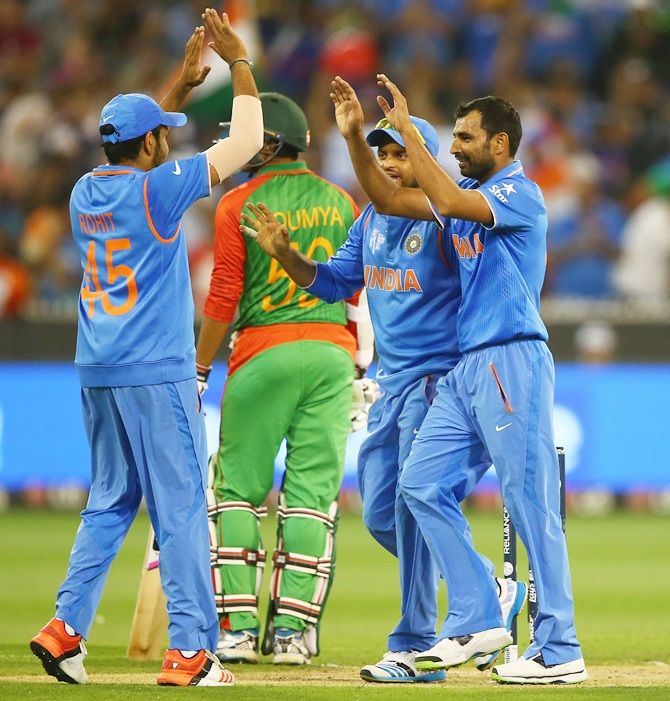
It was that kind of day -- the Indian bowlers and fielders bossed Bangladesh and the catching was eye-catching. Shikhar Dhawan (who late in the innings, after the result was foregone, let one pop out of his hands) on the long leg fence juggled an uppish pull by the potentially dangerous Mahmadullah, realised he was in danger of stepping on the line, tossed it up, did a quick two-step over the line and back, and completed with catch with nonchalant ease.
And three overs later, M S Dhoni reminded viewers of the boyish, half-shy smile he has almost never flashed after becoming the national captain -- and he had reason to. Mohammed Shami produced a cross-seam bouncer that gave Soumya Sarkar, always quick to try the ramp over the 'keeper, no room for manouever. The ball flew fast off the open bat face; Dhoni was moving to his left in anticipation and launched into a headlong dive that ended with the ball in his outstretched left hand.
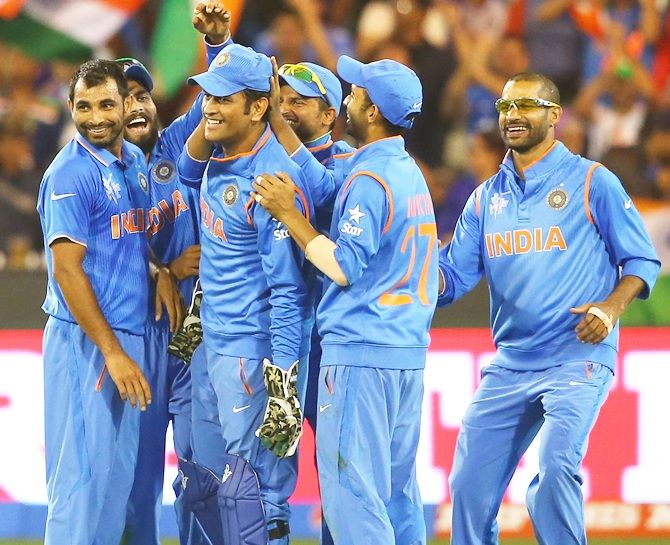
The score then, in the 21st over, was 90/4. All possible danger had been eradicated; fat ladies everywhere began clearing their throats, and the Indian fans -- a good 80 per cent of the 51,500 packing the MCG for the game -- turned the arena into one big block-party.
When it came -- in the 45th over of the Bangladesh innings, with 109 runs separating the two teams -- it was India's 11th successive win across two World Cups, and its 7th in this edition alone.
For the 7th successive time the Indian bowling -- rated the weakest of its links -- had bowled out the opposition, with Yadav leading the demolition with 4/31.
MS smiled, for the second time today. Probably because he was aware that this was his 100th ODI win as captain. Or probably because, in the first of its knock-out games, his team had produced the sort of all-round display that induces smiles.
DON'T MISS PREM'S EARLIER MATCH REPORTS!
- The most searching examination of India's resilience with bat and ball yet
- Dhoni switched to Plan B: Take the pace off the ball and the oxygen out of the game
- A stutter no more, in a modest chase
- India sustain their internsity, to a point
- Wallflower in team of stars, Rahane claims his place under the sun
- When he could not walk with the gods, he was humble to be mortal













 © 2025
© 2025